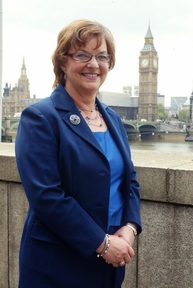Over 80 per cent of people in Wales “satisfied” or “very satisfied” with their homecare
Over eighty per cent of people in Wales are “satisfied” or “very satisfied” with their care, although one in 10 say standards have declined, according to a new report.

The Older People’s Commissioner for Wales, Sarah Rochira, has published a report on the experiences of older people receiving home care in Wales, ‘My Home, My Care, My Voice’.
The report found 85 per cent were often or always provided with good quality care, 80 per cent were always or often listened to and 80 per cent were cared for by people they knew.
However 20 per cent, which equates to 4,000 people in Wales, said they sometimes rarely or never receive good care and one in 10 claimed the service had got worse over the last twelve months.
Almost one in ten older people said around 1,700 rarely or never have enough time with their care worker.
The Older People’s Commissioner for Wales, Ms Rochira said: “I have used older people’s own voices and views to paint a picture of the daily reality for those who receive home care. My report should both reassure but also challenge those who commission and provide home care services in Wales.
“The high numbers of older people who feel they receive a good quality service is heartening and a tribute to the many dedicated home care staff across Wales who provide a valuable service and assistance to older people.
“However, there are inconsistencies in the quality of care provided and as outlined in my previously published work programme working with others across Wales to ensure that our best practice becomes our standard practice will be an ongoing priority.”
A number of people in the survey expressed their dissatisfaction with regard to the skills, knowledge and training of care workers.
The survey found five per cent of older people felt their care worker rarely or never displayed the right skills and knowledge, and a further 16 per cent said these skills were only in evidence on some occasions.
One person commented: “I feel that the care workers need more training they are left to fend for themselves after only a week’s “shadowing” another care worker who has not had any training themselves.”
The issue of how much time homecare workers spend at each home attracted the most comments with some blaming staff shortages.
“Shortage of staff and staff cuts mean there are situations one has to put up with and there is always the worry the care might change or be withdrawn.”
The (UKHCA) carried out a study earlier this year which found home care providers in Wales are themselves concerned about the use of short visits commissioned by councils, with 28 per cent expressing concern about the ability to deliver care with dignity in the shortest visit times, including seven per cent also expressing concern about the ability to deliver services safely.

Bridget Warr, chief executive of UKHCA, commended the Older People’s Commissioner for their work in “championing the voice of people using homecare in Wales and congratulated the providers and care workers who make homecare such a positive experience”.
He said: “We look forward to working with the Commissioner on homecare in Wales, particularly around the commissioning of care which can be the cause of a number of the issues raised by people using homecare.”
The UKHCA also highlighted the reference to a perceived deterioration in satisfaction over the last twelve months.
A spokesman for the UKHCA said: “We believe that this is at least partially a symptom of cost saving strategies by councils, which risk a further deterioration in the ability of local authority, independent and voluntary sector providers to deliver care to the standard that citizens rightly expect, and providers themselves wish to deliver.”
The report reveals that despite the overall proportion of older people in Wales increasing, the numbers receiving home care services continues to fall.
The number of older people in receipt of home care services in 2011 was four per cent lower than the previous year, and represents a 16 per cent fall since 2002.
The patterns of care delivery are also changing. 2011 saw a fall of 25 per cent in the numbers of older people receiving 20 hours or more of home care per week, sharply reversing the upward trend evident in Wales since 2001.
The numbers of older people receiving five hours or fewer per week fell by five per cent compared to 2010.
The proportion of domiciliary care provided in-house by local authorities in Wales varies enormously from as much as 80 per cent to as little as 10 per cent.
On 31 March 2012 there were 407 domiciliary care agencies registered with the Care and Social Services Inspectorate Wales (CSSIW).
Latest News Analysis
 04-Sep-19
Extra £1.5 billion announced for social care in Chancellor's Spending Review
04-Sep-19
Extra £1.5 billion announced for social care in Chancellor's Spending Review
 17-Jul-19
Flexible Working Bill for all jobs gets MPs approval - delighting parents, disabled and carers
17-Jul-19
Flexible Working Bill for all jobs gets MPs approval - delighting parents, disabled and carers
 18-Jun-19
Overnight care workers forced to sleep in offices and told 'bring your own bedding'
18-Jun-19
Overnight care workers forced to sleep in offices and told 'bring your own bedding'
 11-Jun-19
PM candidates on social care: Rory Stewart calls fixing care an 'unfinished revolution'
11-Jun-19
PM candidates on social care: Rory Stewart calls fixing care an 'unfinished revolution'
 05-Mar-19
Amber Rudd announces scrapping of controversial PIP payment review for pensioners
05-Mar-19
Amber Rudd announces scrapping of controversial PIP payment review for pensioners